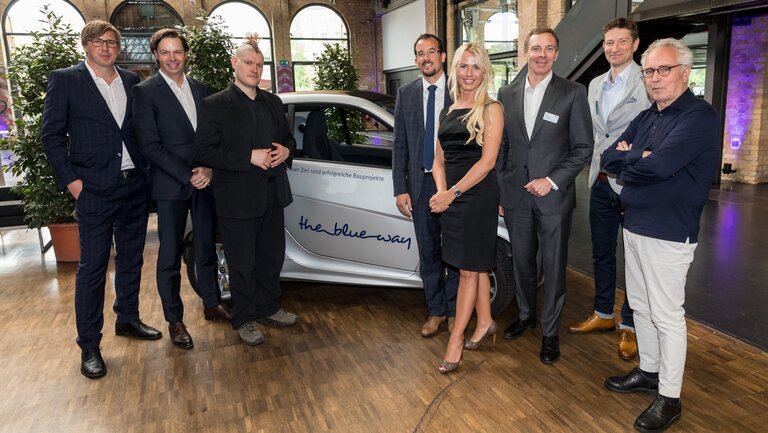More than 150 visitors participated in this year’s innovation forum, which is held by Drees & Sommer in Berlin each spring. They listened to fascinating presentations and discussed new developments and current topics in the construction and real estate industries. When asked why the forum had become such a popular event in the industry’s calendar in recent years, Steffen Szeidl, Member of the Drees & Sommer Executive Board had this to say, “Drees & Sommer is the industry’s innovation driver – and we reinforce this with the Innovation Forum in Berlin. It gives an overview of current market trends and limitations, but also of visions in the areas of Consulting, Planning, Construction and Operation. Following Cradle to Cradle and Digitization in previous years, this year the focus is on ‘Artificial versus Natural Intelligence’. It is particularly important that we not only show visions, but also demonstrate to what extent they can be implemented today – and to prove this with practical examples.”
Artificial intelligence as the next major step in digitization
The morning got off to high-powered start with Sascha Lobo’s presentation entitled ‘Artificial Intelligence’. The author and strategy consultant has long studied the impact of the Internet and the digital world on society, the economy, politics, and culture. He began by explaining what artificial intelligence is. According to him, “Artificial intelligence is the next great step in digitization. The technology itself identifies the nature of the problem, develops a basic solution for it, and expresses this in the form of a machine-based process that can be constantly improved.” Given that ever more data sources can be evaluated and exploited economically with ever-greater efficiency, artificial intelligence is truly on the brink of a breakthrough.
New security concepts necessary
When it comes to the real estate and construction sectors, Lobo believes that artificial intelligence will impact nearly every area of the value chain. “It could completely transform the real estate industry – from planning and construction to building operation. With regard to building operation, for example, in the future, intelligent systems will respond continuously to all available data streams from building sensors, refine their usage analysis and forecast usage scenarios, and be able to independently respond immediately. This also requires completely new security concepts in order to protect from future hack attacks. For Lobo, the digital transformation results in one clear recommended course of action for the industry: “As the real estate industry involves very long-term investments with long life cycles, companies will have to take a much more forward-looking approach and correctly forecast digital developments in order to ensure they are not left behind. And that has to happen now, even if many companies are not yet under any great pressure to act.”
Low tech versus high tech
Showcase projects for smart buildings such as ‘The Edge’ in Amsterdam and the planned glass ‘Cube Berlin’ give a good idea of what digital networking already makes possible in the construction and real estate industries. The office building ‘2226 – Building without heating, ventilation and air conditioning’ designed by the architectural firm Baumschlager Eberle Architekten – which manages almost entirely without conventional building services equipment – is regarded as a radical design. Nikolai Worp, Executive Commercial Director Germany at OVG, Prof. Dietmar Eberle, Professor for Architecture and Design at the Swiss Federal Institute of Technology (ETH) Zurich and partner at Baumschlager Eberle Architekten discussed ‘Low tech versus high tech’ and the differences between the two approaches.
For Professor Eberle, the focus for buildings is on creating a sensible relationship between materialityand technology: “Our office building 2226 is a combination of determined materialityand a technology with the minimum software to replace conventional building services equipment for heating, ventilation and air conditioning. Because it is invisible, it is immune to any form of mechanical romanticism and can be deployed completely pragmatically.
Worp was in particular of the opinion that progressive digitization would necessarily lead to increased energy consumption – both in households and offices: “If you really want to develop sustainable buildings, there is no way around considering strategies for the eco-friendly generation of energy in addition to ideas for energy saving. Digital technologies provide the solutions in both areas. With its combination of energy saving thanks to sensor-controlled automation and energy generation from a facade of high-efficiency solar panels, ‘The Edge’ in Amsterdam is truly a building that produces more energy that it consumes.
Dr. Peter Mösle, Partner at Drees & Sommer SE with responsibility for topics such as Cradle to Cradle and Blue City, emphasized at the conclusion of the discussion: “When it comes to the future of construction, high tech can, for the future, be defined as smart tech. At the same time, simple, natural solutions will become increasingly important. So what we need is a smart combination of the two approaches. How intelligent or simple a building can or must be is decided case by case based on the associated factors and local conditions – and there are numerous variations here that all have to be designed specifically for the project at hand.
‘Artificial and natural intelligence, a great combination’
In the afternoon, Drees & Sommer experts Norbert Otten and Klaus Dederichs gave a joint presentation entitled ‘Best Practice: Smart Buildings Intelligently Planned’ in which they covered topics including the special characteristics of the planned glass structure ‘Cube BERLIN’ at the Central Station, that is to one day to become Europe’s smartest and most innovative building. This was followed by a presentation by Big Data specialist and Resolto Managing Director Tanja Krüger on the topic ‘Fast reliable and continuous: How artificial intelligence brings added value to buildings’. She came to the same conclusion: “Artificial intelligence opens up new dimensions of automation. That gives usthe opportunity to focus on tasks that we enjoy and allows us to become more creative, while at the same time increasing the level of precision and reducing errors. So artificial and natural intelligence are opposite sides of the same coin – a great combination.”
